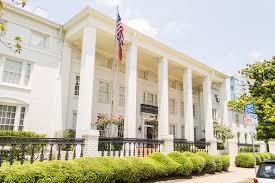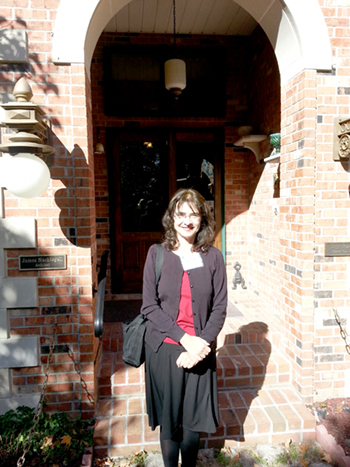 University Greek Life: A "Super-Spreader" of Independence? By Matthew G. Andersson, guest writer (posted by Mary Grabar, September 8, 2020):
University Greek Life: A "Super-Spreader" of Independence? By Matthew G. Andersson, guest writer (posted by Mary Grabar, September 8, 2020):
“The surest way to corrupt a youth is to instruct him to hold in higher esteem those who think alike than those who think differently.” Nietzsche, The Dawn, 1881
I wouldn’t normally insert myself in a contention over university Greek societies (fraternities and sororities), but in this current public health context there is an unusual risk to our nation’s campus culture that is simmering beneath the surface of its more customary spirit and generosity—a symptom of its current health “biosecurity” authoritarianism, and partisan political activism.
Greek fraternities and sororities (sometimes called “GLO’s” or Greek Letter Organizations) are being singled out by the Left press as uniquely responsible for promoting social gatherings and with such revelry apparently, that they are a purported “danger” to the entire college campus, by acting as a so-called “super spreader.”
Some college administrations and student organizations are arguing that the Greek system should be formally recognized by universities, in order to have them come under the new corporate-wide “Covid tent,” if only from a social network perspective, and thereby providing as much common participation and coordination with the rest of the University as possible. Most Greek societies host independent corporate charters, and are typically “non-recognized organizations.” Many special interests now believe they should come under broad university administrative control, adapted to “RSOs” or recognized student organizations, and subject to explicit university Articles, by-laws and policy enforcement. Such thinking assumes that if health policy benefits are to be optimized then everyone on a college campus has to participate (economists call this “Metcalfe's Law,” where a network’s value is a square of the number of common members in that network. It is effectively a “herd” phenomenon).
While colleges are in some cases making a nuanced argument about the benefits of cooperation and shared health responsibilities among university campus groups, they regard the absorption of Greek organizations into university control as a singular “ essential emergency measure”
In general the nation’s university Greek systems are explicitly targeted in major media as representing unique coronavirus health risks and are even characterized as deliberate incubators.
Why the obsession with university Greek systems? Greek life is otherwise only one part of a very large mix of campus social interactions, and such assertions have to be separated from other institutional criticisms (such as hazing). But is something else at work here? Along with football, red meat, Catholic churches, SUVs, “White supremacy,” and financial capitalism, are Greek fraternal organizations being attacked by the Left on cultural, religious, even racial grounds, in addition to their general political orientation, which tends to be conservative or Republican?
Starting down the path of separating groups, organizations, cultures, and societies based on the Covid phenomenon, even if unintended, is very slippery: There is a fast-moving danger of cultural bias, prejudice, hostility and even alienation, insidiously finding broad currency in “biosecurity” pretext. A tribal phenomenon can capture the psychology of a group, separating the welcome and the unwelcome, the acceptable and the unacceptable; the safe and the “unsafe,” the normal and the “divergent.” At that point, students may find themselves in a dangerously transformed psycho-social dimension that they may not have thought was personally possible—their own “Lord of the Flies” campus island, where the anxiety of survival turns one person against the other, one group against another group, until the society collapses morally, the social contract splintered--hence the larger social threat posed by the ways a community discerns, judges and acts on, the risks perceived by the current virus.
If health concerns about formal group socialization are otherwise going to be credible, they would have to be ideologically, culturally and ethno-religiously blind. The Hillel system, Chabad Lubovitch, synagogues, temples, or any other social or even academic clubs that congregate participants, including any Asian organizations, exclusive Black and Muslim fraternities, chorus and orchestra groups, sports, along with LGBTQ member organizations or even an astronomy club or various institutes of politics, among others, would all have to be included.
Where does it stop? At some point the calculus becomes untenable as all group social behavior, large or small, celebratory or academic, would be indicted, at which point the entire social order is upended. The Covid phenomenon apparently doesn’t discriminate between beer or Brahms, conversation or calculus, so just how far are we all willing to go; who decides what is a “safe” pleasure or an unsafe indulgence? If “Greek life” is a threat, then all life is a threat (this assumes Dionysius is equally valued with Apollo, and that either can be equally misleading).
Moreover, any university campus is subject to numerous daily external guests and visitors: construction workers, contractors, consultants, caterers, employees, shipping companies, recruiters, government researchers, visiting academic speakers, tourists and visitors from around the world, hundreds of people admitted to university hospitals and medical systems, and even the homeless. Are all these people party to an enforceable campus Health Pact? If not, how the Greek system, or any other university or college student organization is chartered and affiliated, is really more a value judgement or economic assessment, than it can be a legitimate health marker.
All university and college activities in a biosecurity policy are either de facto legitimate, and subject to certain shared principles, or they are disqualified on other grounds. Whether those principles, such as Chicago’s “Health Pact” and related management systems are technically coherent and enforceable, may be the larger subject of consideration. Human social systems are dynamic, porous, informal, and constantly assembling and reassembling in new configurations. This makes biosecurity an effectively impossible construct to maintain, other than largely in psychological dimensions, and as an administrative public relations expression.
 There is no doubt that some student social, political and other organizations in higher education come under fire for their behavior. Many fraternities and sororities on America’s campuses, however, contain some outstanding organizations with admirable culture, goals and objectives, many providing a positive socialization to its members, its guests and others whom it may influence by contributing to a value ethic, scholastic standards, volunteerism and charity, and independence and leadership. In my own case as a young undergraduate, the Pi Beta Phi sisters at the University of Texas at Austin provided a welcoming and inspiring example based on a long tradition of instilling positive conservative cultural expectations between men and women, indeed between all people. Through them, I even met my future wife, and together we enjoyed meeting many other students, faculty and families, and participating in healthy and rewarding social, civic and academic events.
There is no doubt that some student social, political and other organizations in higher education come under fire for their behavior. Many fraternities and sororities on America’s campuses, however, contain some outstanding organizations with admirable culture, goals and objectives, many providing a positive socialization to its members, its guests and others whom it may influence by contributing to a value ethic, scholastic standards, volunteerism and charity, and independence and leadership. In my own case as a young undergraduate, the Pi Beta Phi sisters at the University of Texas at Austin provided a welcoming and inspiring example based on a long tradition of instilling positive conservative cultural expectations between men and women, indeed between all people. Through them, I even met my future wife, and together we enjoyed meeting many other students, faculty and families, and participating in healthy and rewarding social, civic and academic events.
In that regard, university pleas for their larger, formal university affiliation may be seen as constructive, but not necessarily in the ways they want. Independent Greek fraternal societies may transcend, indeed respond to precisely the university corporate authoritarianism and conformity that administrations seek. That stems inherently from their continued, necessary legal independence from official university control. The roots of Greek college societies go back to the College of William and Mary in 1776, as a way to enlarge student independence, cohesiveness and influence. Phi Beta Kappa’s original motto then, Philosophia Biou Kubernētēs or "Philosophy is the guide of life,” may take on a new dimension of modern inspiration for college students, as they struggle with the tension between institutional “social distancing” and the inherent need for personal social bonding. Classical Greek philosophy’s virtue ethic of character development is based on free self-determination, and the balancing of logos, pathos and ethos, leading to telos (full potential and inherent purpose) That is, the strengthening of reason or the “life of the mind” (logos), with compassion, and a spirit of community. Those values begin with autonomous, self-directed judgment, not from enforced institutional control.
Such independence is especially vital today, and as it always has been, where power and force threaten free association and liberty.
 Matthew G. Andersson is an alumnus of the University of Chicago, the University of Texas at Austin, and is a technology entrepreneur, author and college parent.
Matthew G. Andersson is an alumnus of the University of Chicago, the University of Texas at Austin, and is a technology entrepreneur, author and college parent.





